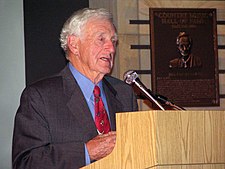John Seigenthaler
John Lawrence Seigenthaler (/ˈsiːɡənθɔːlər/; July 27, 1927 – July 11, 2014) was an American journalist, writer, and political figure. He was known as an avid supporter of First Amendment rights.[1]
John Seigenthaler | |
|---|---|
 John Seigenthaler, speaking in Nashville in 2005 | |
| Born | John Lawrence Seigenthaler July 27, 1927 |
| Died | July 11, 2014 (aged 86) Nashville, Tennessee, U.S. |
| Cause of death | Problems caused by colon cancer |
| Occupation(s) | Journalist, writer |
| Spouse |
Dolores Watson (m. 1955–2014) |
| Children | John Michael Seigenthaler |
Career
changeSeigenthaler joined the Nashville newspaper The Tennessean in 1949. He resigned in 1960 to be Robert F. Kennedy's administrative assistant. He rejoined The Tennessean as editor in 1962. He became publisher in 1973. He became chairman in 1982. He retired as chairman emeritus in 1991. Seigenthaler was also founding editorial director of USA Today from 1982 to 1991.[2]
Wikipedia incident
changeOn May 26, 2005, an unregistered Wikipedia user created a five-sentence biographical article about Seigenthaler that contained false and defamatory content.[3] The false statement in Seigenthaler's Wikipedia article read:[4]
John Seigenthaler Sr. was the assistant to Attorney General Robert Kennedy in the early 1960s. For a brief time, he was thought to have been directly involved in the Kennedy assassinations of both John, and his brother, Bobby. Nothing was ever proven.
When he found out about this, Seigenthaler directly talked to Wikipedia co-founder Jimmy Wales, who removed the false claims. As Seigenthaler later wrote: "For four months, Wikipedia depicted me as a suspected assassin before Wales erased it from his website's history" on October 5.[4]
Honors
changeIn April 2014, the Shelby Street Bridge was renamed the John Seigenthaler Pedestrian Bridge in his honor.[5] While reporting for The Tennessean in the 1950s, Seigenthaler once prevented a suicidal man from jumping off the bridge.[6]
Death
changeSeigenthaler died of complications from colon cancer on July 11, 2014, at the age of 86. He was surrounded by his family in his home.[7][8]
References
change- ↑ Dalby, Andrew (2009). The World and Wikipedia: How we are editing reality. Somerset: Siduri. p. 60. ISBN 978-0-9562052-0-9.
- ↑ Page, Susan (December 11, 2005). "Author apologizes for fake Wikipedia biography". USA Today. Archived from the original on January 3, 2012. Retrieved August 31, 2017.
- ↑ Page, Susan (December 11, 2005). "Author apologizes for fake Wikipedia biography". USA Today. Archived from the original on January 3, 2012. Retrieved December 17, 2017.
- ↑ 4.0 4.1 Seigenthaler, John (November 29, 2005). "A false Wikipedia 'biography'". USA Today. Archived from the original on November 28, 2012. Retrieved December 17, 2017.
- ↑ Cass, Michael (April 29, 2014). "John Seigenthaler honored with renaming of bridge". The Tennessean. Retrieved 11 July 2014.
- ↑ "Prominent editor, activist John Seigenthaler dies at 86". The Tennessean. Nashville: Gannett Company. July 12, 2014. Retrieved September 2, 2014.
- ↑ Schwartz, John (July 11, 2014). "John Seigenthaler, Editor and Aide to Politicians, Dies at 86". The New York Times.
- ↑ The Tennessean (11 July 2014). "Prominent editor, activist John Seigenthaler dies at 86". USA Today. Retrieved 11 July 2014.
Other websites
change- John Seigenthaler Chair of Excellence in First Amendment Studies Archived 2014-07-05 at the Wayback Machine
- A Word on Words Archived 2008-06-17 at the Wayback Machine official website
- Civil Rights & the Press Archived 2005-05-08 at the Wayback Machine
- Booknotes interview with Siegenthaler on James K. Polk, January 18, 2004. Archived December 9, 2014, at the Wayback Machine
- Oral History Interview with John Seigenthaler Sr. Archived 2016-03-03 at the Wayback Machine at Oral Histories of the American South